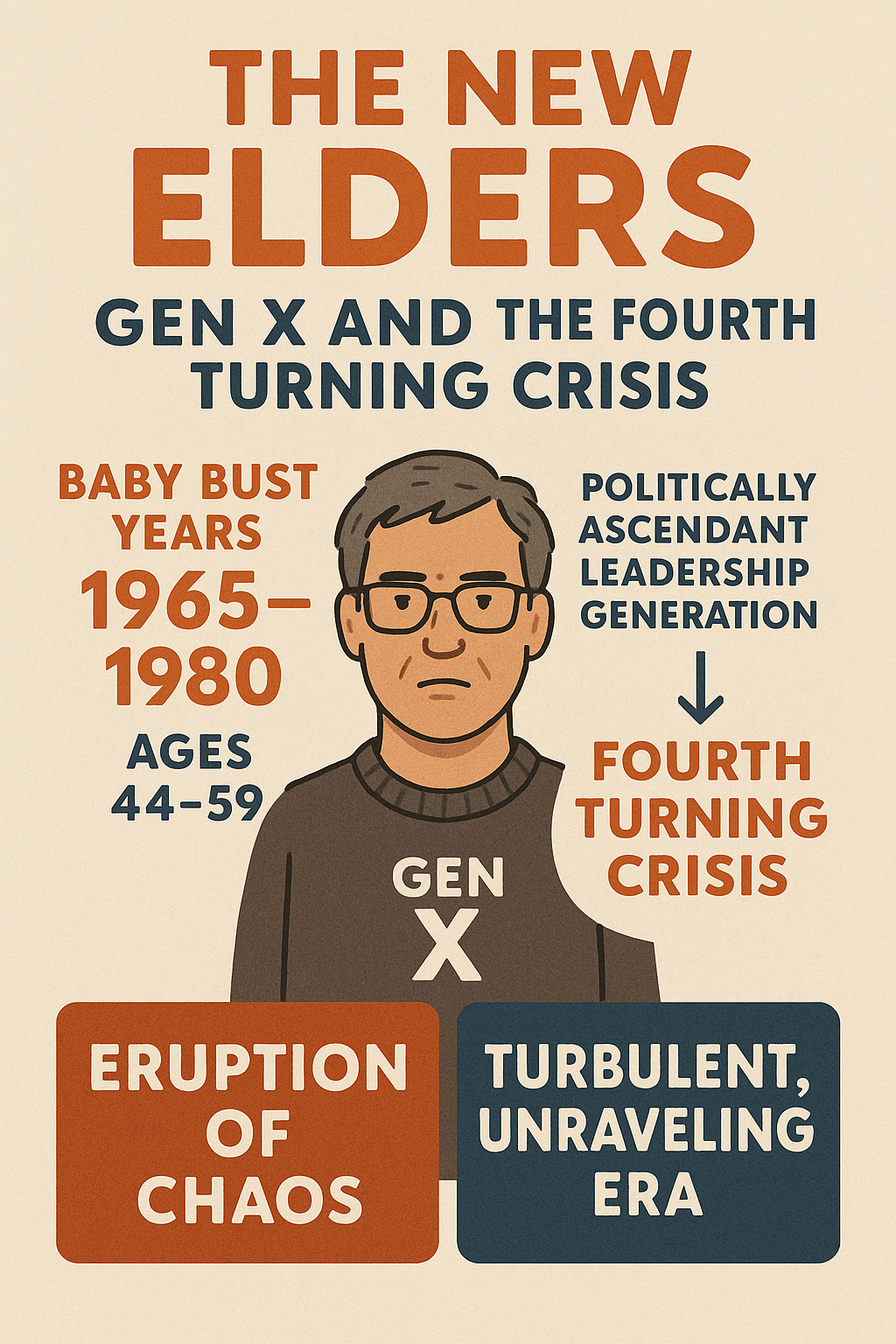In a deeply resonant conversation on “Rabbit Hole,” Neil Howe, co-author of The Fourth Turning and Generations, outlines the emerging role of Generation X as society enters the climax of its current historical cycle. Through Howe’s lens, generational theory reveals a critical transformation not only in social behavior and values, but in who must lead during periods of upheaval. As we sit amid what he defines as the Fourth Turning—an existential societal crisis—the so-called “nomad generation,” Gen X, is called to evolve into pragmatic elders who will stabilize and rebuild a collapsing order.
The Fourth Turning Framework: Crisis and Regeneration
Howe’s theory posits that history follows a saeculum, a roughly 80-100 year cycle comprised of four “turnings”:
- High – Institutions are strong, and individualism is weak.
- Awakening – Institutions are attacked in the name of personal and spiritual autonomy.
- Unraveling – Institutions are weak and distrusted, while individualism is strong.
- Crisis (The Fourth Turning) – Institutions are rebuilt or replaced, typically following a period of destruction or upheaval.
Howe identifies our current historical moment as the Fourth Turning—a time of unraveling institutions, economic uncertainty, and civil conflict. The parallels with previous Fourth Turnings, like the Great Depression and World War II, are stark.
The Crisis Is Right on Schedule
Originally forecasting a crisis around the 2020s in his earlier works, Howe notes that while the crisis has indeed emerged, it has done so on a slightly delayed timetable due to generational phase dilation. Young adults are taking longer to enter adult roles: marriage, parenthood, and leadership all arrive five to seven years later than in past generations. The average age of national leadership is significantly older, and society’s structural transition has elongated accordingly.
From Disillusionment to Duty: The Gen X Predicament
Born between 1961 and 1981, Gen X occupies a unique generational role. Howe categorizes them as “Nomads” — independent, pragmatic, skeptical, and shaped by neglect. Gen X grew up in an era of broken homes, individualism, and cultural cynicism, often typified by latchkey childhoods and a general feeling of being ignored or superfluous.
The emotional and philosophical DNA of Gen X is one of survival and self-reliance. They came of age in an unraveling America, mistrusting both the system and grand narratives of progress. As such, they’ve largely avoided public institutional leadership, opting instead for contrarianism, individual entrepreneurship, and non-conformity.
Yet now, Gen X finds itself aging into power during a societal collapse that demands the very qualities they have long avoided: institutional stewardship, generational mentorship, and community leadership.
A Generation Without Elders
One of the starkest problems Gen X faces is that they never learned how to age into eldership. They had no clear rites of passage and no mentors who modeled that transition. Raised with libertarian instincts and a deep distrust of systems, they now must lead those very systems into transformation.
Historically, Gen X mirrors the Lost Generation, born at the turn of the 20th century and coming of age during World War I. These individuals endured global upheaval and then, in midlife, stabilized society during the Great Depression and WWII. They were not idealists but pragmatic rebuilders. In the 1930s and 1940s, they presided over the foundational institutions of what would become the American High, constructing systems of stability from a place of hardened realism.
Gen X is now poised to play that same role. Their individualistic ethos, once a defense mechanism, must evolve into an anchor for communal reconstruction.
Millennials and the New Collectivism
If Gen Xers represent risk-savvy loners, Millennials are collectivists shaped by overprotection and economic stagnation. They invest together, vote together, and form values in sync with peer consensus. In Howe’s view, this generation’s trust in large-scale coordination makes them suited to inherit and manage the institutions Gen X is now tasked with rebuilding.
Millennials are the “hero” archetype in generational theory, meant to rise during the Fourth Turning to lead its resolution. But they need someone to build the scaffolding first—to secure the foundations of civic order before assuming the reins. That job belongs to Gen X.
The Psychology of Crisis and the State
Howe discusses how late-stage crises invariably involve inflation, public mobilization, and state consolidation of economic levers. When survival is on the line, societies move toward collectivism: taxing, borrowing, and inflating to marshal national resources. Inflation, in this framework, is not a bug but a feature—a way to share burdens and erase old debts.
This pattern, seen in both the Civil War and WWII, will likely repeat. We are entering a period of financial repression, where institutions like banks and pensions are required to hold government debt at negative real interest rates. These conditions, which redistribute wealth and suppress dissent, are classic features of systemic consolidation.
Risk Aversion and Collective Risk Taking
A paradox noted by Howe is that as societies become more individually risk-averse (as with Millennials and younger Boomers), they paradoxically become more willing to take collective risks. In times of danger, citizens favor massive governmental actions over personal ventures. Thus, while individuals hedge, the society as a whole becomes more volatile.
This explains the rise of financial markets shaped by government intervention and the cultural sense that no one will be left to fend for themselves. Gen Xers, with their hard-earned understanding of individual risk, may be the best generation to balance this dynamic.
Conflict: The Incubator of Community
Howe references the foundational insight of early sociologists like Durkheim and Weber: conflict builds community. National identity is forged in common suffering. The reason the American High (1946-1964) was so stable and unified was because it followed World War II.
The crisis teaches society that unity is survival. Gen X must become the custodians of this lesson, even though they were raised to go it alone.
A Global Fourth Turning
In a globalized world, national Fourth Turnings are increasingly synchronized. Leaders from Russia, China, India, and elsewhere are Boomers who came of age in the aftermath of their own countries’ great crises. As these leaders age and their societies descend into polarization, populism, and nationalist fervor, similar cycles of collapse and regeneration are playing out worldwide.
Whether America leads or follows, it will not be alone in its societal reckoning.
Bitcoin and Stateless Institutions: An Open Question
While Howe concedes that not all regeneration must be state-driven, he maintains that community is non-negotiable. Institutions may be built around ideas or technologies like Bitcoin, but their success will depend on whether they foster collective identity and shared sacrifice. If conflict is the incubator of community, then even stateless systems must prove themselves through hardship.
The Irony of Role Reversal
Perhaps the greatest irony of Gen X’s journey is that those raised in a time of social disintegration must now build structure. The generation that mistrusted institutions must now create them. The generation that learned to live without community must now defend it.
And they are not alone. Millennials, coming of age in an era of economic precarity and social fragmentation, are eager to follow pragmatic leaders. Gen X may not have been trained for elderhood, but they are the generation history has selected for it.
Conclusion: From Nomads to Anchors
Gen X’s true legacy will not be defined by their rebellion, but by their stabilization. If the Fourth Turning culminates as expected, this generation will anchor the ship during the storm. With their deep understanding of risk, pragmatism, and bullshit detection, they will build the foundations upon which Millennials will construct the next long summer.
In a society collapsing under its contradictions, Gen X must now embrace the role they never sought: the no-nonsense elders of a new American order.







